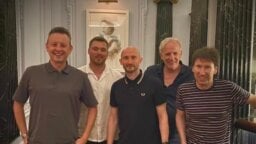It started, as so many of these stories do, on pint three, in the pub. Two decades ago, Mark Lewis and Martin Toher were growing tired of their day jobs as major record company A&Rs.
Adding to the ever-present precariousness of their careers was the industry consolidation swirling around them: Lewis’s home of London Records had been recently acquired by Warner Music Group, while Toher’s employer, A&M, had been rolled up into Mercury Records.
“A lot of drink was going down between the two of us at that time, accompanied by a lot of pub talk,” says Lewis today. “It was like: so-and-so’s going to buy so-and-so, we can see where everything’s headed, and we’re powerless. This is not what we want for ourselves. What about starting our own label?”
That thought, catalysed by friend, super-mixer, and fellow pub-talker, Mike ‘Spike’ Stent, soon became destiny. These days, Lewis and Toher’s B-Unique has cemented a long track record of success both in the recorded music world (Kaiser Chiefs, Ordinary Boys, Kodaline) and, particularly, in the publishing world.
As a publisher, B-Unique has been involved with standout British songwriters over the past 20 years that include James Bay, Jonny Coffer (Rag N Bone Man, Sam Smith, Naughty Boy), Corey Sanders (Calum Scott, Sigala, Chainsmokers) and Johnny McDaid – whose 28% cut on Shape Of You handed B-Unique a proportion of the biggest ever song on Spotify.
There’s also been a big-money deal with US giant Spirit along the way, which saw Toher and Lewis sell off their early publishing catalog in 2015, and run a JV – Spirit B-Unique – in the UK for the past five years. (The duo are now back fully independent, heading up B-Unique Mk.3, which is entirely owned by themselves.) Things, though, didn’t start off quite so rosy.
Back at the turn of the Millenium, Toher and Lewis chucked their major label redundancy cheques into B-Unique’s bank account – £10,000 each – with the same size contribution coming from Stent (who would later shake hands with the duo and depart from the company). And from there… well, they soon realised they were out of their depth.
Recalls Toher: “What surprised me was that, after you’ve been in A&R at a major label for 10 years, you think you know a lot, but you’ve actually been incredibly cushioned from the harsh realities. Starting our own company showed us how little we actually knew about the music industry.”
Adds Lewis: “When you’re an A&R at a major label, you’ve got this whole support team around you; you’re the basketball player that dunks the ball. But you’re shielded from seeing what’s happening behind you; you don’t see all the work that’s going on. You just say, I’ll dunk that, and then do the lap of honour. The start of B-Unique was one hell of a baptism of fire.”
“Starting our own company showed us how little we actually knew about the music industry.”
It was a particularly scary baptism for Lewis, who says he had two small children at the time, and was relying on B-Unique’s success to put food on the table. “It was an incredibly naive move,” he says with a grin. “Doing this interview is like watching a movie back and you’re seeing yourself jump between two buildings, thinking: How the heck did I even manage that?”
Some British indie music companies’ successes are fuelled by a talisman’s energy and ego (doffs hat to Mr. McGee); some are fuelled by connections into a world others can’t reach into (doffs hat to Mr. Blackwell).
And some are fuelled by the simple, human fear of looking a bit of a twat. B-Unique, certainly in its early years, was the latter.
“At certain points, 18 months in, I was thinking: ‘Oh my God, why have we done this?’ This is the worst move of our life!” admits Toher. “We were some of the first major label A&R guys of our generation to walk out of a major and try to start an independent with our own money. What quickly became apparent, and this was a shock, was that to many people in this industry, once you’ve lost your major label status, you suddenly become invisible.”
Adds Lewis: “It was literally: we’ve got to make this work, because everyone’s going to be laughing at us if we come crawling back [to the majors] begging for a job. So it was: head down, let’s run.” Following a fallow first 18 months (watching those £10,000 contributions fizzling down to near-zero), B-Unique hit a lucky break.
Lewis and Toher were making semi-frequent trips to the US in search of a hit; instead, they found punk label Vagrant Records, who agreed to license the duo recordings from the likes of Saves The Day and Alkaline Trio for the UK. This not only brought much needed cash-flow into B-Unique – it allowed Lewis and Toher to experiment with marketing records in the CD and download-dominated world of the early noughties.
B-Unique’s first British breakthrough as a label came with Aqualung, whose self-titled debut album went Top 20 in 2002, including the track Strange & Beautiful, which became a major sync hit off the back of a Volkswagen Beetle ad. But not before B-Unique’s first run with a UK band – Scottish act Regency Buck, managed by a certain Merck Mercuriadis. “We ballsed it all up, basically,” says Toher of B-Unique’s pre-Aqualung, pre-Vagrant strategy. “The whole execution was wrong.”
When Aqualung did start taking off, says Lewis, “There wasn’t much joy going down – it just felt like relief; like, okay, so we can actually do this. We’ve got a hit on the board, so people can stop saying we haven’t.” The historic turning point for B-Unique’s label was signing Brighton-based The Ordinary Boys, led by frontman Sam Preston, in 2003.
“That was the first time we came up against the major labels for a signing,” recalls Lewis. “We were the indie punching above our weight; RCA were super keen to sign them, Polydor too. But we camped out in Brighton 24/7. When they did a rehearsal, we were there. When they went for a drink afterwards, we were there. And it kind of worked.”
“We never talk ourselves into signing something – it’s usually physical.”
An ever-present figure in the NME world for a few years, Sam Preston’s journey is set in modern UK music biz folklore: having fallen out of favour with the indie-cool writers, Preston entered the Celebrity Big Brother house in 2006, and ending up marrying (later divorcing) the show’s winner, Chantelle Houghton, complete with Hello!-sponsored wedding. Preston then got (rather cruelly, in hindsight) scorched on Never Mind The Buzzcocks, before fighting back against the odds to become a successful behind-the-scenes songwriter for the likes of Olly Murs, Enrique Iglesias and Kylie Minogue.
“I don’t think B-Unique would be around today if it wasn’t for Preston,” says Lewis, with obvious fondness. “When he started having success as a songwriter, writing Heart Skips A Beat for Olly Murs [UK No.1 in 2011] that gave me more pleasure than anything, because it was like, this guy’s been through it, with us, with his band, and now he’s writing hits as well.”
What’s less well known in the Preston story is that it was he who tipped off B-Unique on the company’s big mainstream breakthrough: Kaiser Chiefs. The Ricky Wilson-led band scored a No.1 and two No.2 albums via B-Unique/ Polydor between 2005 and 2008 – but not before supporting the Ordinary Boys on a fateful tour.
“I turned up at a gig in Bristol, and got a bit of a bollocking from Preston,” remembers Lewis. “He was like: ‘You didn’t watch the support band?’! You should – they’re amazing.’ The next night I went to see them and was like: ‘Wow. I’ve just watched four hits in a row.’”
At this point, B-Unique comprised of Lewis, Toher and Paul Harris (now at Warner Music in Australia) working out of a house in Acton. Their dream was to achieve a Silver-certified album with Kaiser Chiefs’ 2005 debut, Employment.
Once pre-orders started spiralling above 100,000, then 200,000, remembers Toher, “It was like: Oh my God. There’s only three of us; this is getting out of control.” Says Lewis: “I remember coming into the office one morning, and Martin was having an absolute wig out. He’s going, ‘We haven’t cleared Graham Coxon’s motorbike noise on the start of a track! EMI are going to make us pull 400,000 albums!’”
Such stresses led to B-Unique inking a marketing and distribution deal with Polydor, then run by Colin Barlow and David Joseph. “Polydor were great partners,” says Toher. “Colin and David were amazing and delivered on everything they promised; Lucian [Grainge] got personally involved as well.” Erm, one question chaps: Didn’t this “amazing” partnership play out barely months after you’d stiffed the very same Polydor by beating them to the signing of the Ordinary Boys?
“You know what this business is like,” laughs Lewis. “The king is dead… long live the king. Onto the next one!” Post-Kaiser Chiefs, B-Unique’s label enjoyed success with Irish band Kodaline – eventually inking a partnership with Sony Music for the platinum-selling group (who are now back with B-Unique independently). There was also a run of releases from the likes of Primal Scream, The Automatic and The Twang – but, around 2010, Lewis and Toher had noticed that the skinny-jeans-and-winklepickers second coming of UK indie guitar music was flagging.
“As that decade wore on, everyone in that [guitar] space ran out of headroom,” says Lewis. “I think we exhausted the public’s love with indie guitar acts.” Until this point, B-Unique’s publishing company had been a sideshow to its label. But now, Lewis and Toher made the instinctive decision to switch their attention to songwriters.
Their first smart decision was to treat B-Unique’s publishing sync efforts like they would if it were a label – scoring major placements for Miles Kane and Benjamin Francis Leftwich, including three tracks for the latter artist in smash US drama Grey’s Anatomy. From there, B-Unique signed pubco deals with John Newman and James Bay – whose 2015 debut album, Chaos And The Calm [2015] was a huge UK No.1. It was the duo’s signing of Jonny Coffer around this period, though, that would transform B-Unique into a ‘proper’ publisher, able to develop non-artist songwriters and land cuts on smash records.
“I got a call from a lawyer, Simon Long, and he just said to me: ‘Could you meet this young client of mine, Jonny Coffer? I think he’s really talented.’” recalls Lewis. “I went to go for a coffee with him, even though I’d heard some of his music he’d sent over and didn’t really like it! But by the end of that coffee, I was saying: ‘I want to sign you.’
“Everything in my instincts told me that this guy was going to be a big writer. Jonny’s an incredibly talented person, and he had this intensity about him; you just knew he was the real deal, and Martin felt exactly the same way.” The idea of Lewis and Toher “feeling” that they needed to sign Coffer – rather than scanning trillions of lines of data to signpost their decision – says a lot about their A&R approach. Music Business Worldwide asks the duo what it is about a given artist or songwriter that tells them they have to get their signature on a contract. The answer is telling.
“For us, instinct is everything. We go into a room, and you just know whether someone’s got that DNA, and if they’ve got that hunger.”
“For us, instinct is everything,” says Lewis. “We go into a room, and you just know whether someone’s got that DNA, and if they’ve got that hunger.” He adds: “We both feel it; it goes beyond words. We never talk ourselves into signing something – it’s usually physical, with us ending up charging around the room. It helps having two of us rather than just one, because if we’re both absolutely convinced about something, we know it’s definitely got a shot.”
After Jonny Coffer landed a smash with Naughty Boy and Sam Smith’s La La La [2014], both the songwriter and B-Unique’s stock as a home for hitmakers rose considerably. Over the next two years, Coffer would gain cuts on two other major Beyoncé singles: Runnin’ (again with Naughty Boy) and Freedom, a Grammy-nominated standout on Queen B’s Lemonade album.
B-Unique’s biggest hit, though, was yet to come. In summer 2014, Lewis and Toher flew out to the US to catch up with Kodaline – whose debut platinum album had been released the year before. The band were recording sessions for their second album in Los Angeles… but when Lewis and Toher landed at LAX, they were informed Kodaline had been kicked out of the studio.
“For whatever reason, it wasn’t working,” says Toher, “but it meant we were kind of stuck in L.A, scratching our heads over what to do. So we decided to hunt down Johnny McDaid, and we ended up meeting him in Malibu. He told us he loved Kodaline. Five weeks later, the band went back to L.A and recorded a song with him that ended up on the album.”
At this point, McDaid was still very much ‘Johnny McDaid From Snow Patrol’. As opposed to ‘Johnny McDaid, One of the UK’s Most Successful Pop Songwriters of the Modern Age’. Impressed by McDaid, Toher and Lewis set about striking a partnership deal between B-Unique and Polar Patrol – the publishing company set up by Snow Patrol to house the band’s various songwriting copyrights.
“We instantly clicked with Jonny Quinn [Snow Patrol’s drummer who oversaw Polar],” says Toher, “and knew we’d work well together.” Two years on, having secured cuts on Ed Sheeran’s Photograph, as well as singles from Birdy, Robbie Williams and Zara Larsson, McDaid invited Lewis and Toher over to hear some new tracks – including a tropically-influenced number created in a session with Ed Sheeran and Steve Mac.
What did it feel like to hear what would become the biggest Spotify hit of all time, for the first time? “He played us three songs, and they were all great, and then he played Shape Of You,” says Lewis.
“Genuinely, both me and Martin, our faces, our shoulders, just went rigid. What a song.” He adds: “The stats about Shape Of You are staggering, but more pleasing for us is what it did for Johnny. From there he went into writing for Pink [What About Us], Alicia Keys [Underdog] and the other Ed stuff. When we met Johnny he was a part of Snow Patrol but hadn’t really had any major hits on his own. So to watch Photograph happen, then Shape Of You and everything else was just fantastic, because he’s a wonderful person.” Toher chimes in: “Although it wasn’t all plain sailing…”
Ah, yes. Ed Sheeran’s Photograph became the target of an aggressive plagiarism suit in the US in 2016, spearheaded by notorious copyright-chasing lawyer, Richard Busch (he of Marvin Gaye Estate vs. Blurred Lines fame). Sheeran, McDaid and co strongly deny any hint of copyright infringement, but the $20m suit was eventually settled in 2017. (Sheeran’s lawyers complained that Busch’s suit contained “a bevy of scandalous, offensive and insulting accusations… which serve no purpose other than to seek to embarrass [the] defendants and tarnish their reputations.”)
Is this growing trend – of US copyright writs landing on the desk of music publishers involved in global smashes – a painful part of B-Unique’s modern world? Jokes Toher: “I’ve taken to calling it a ‘positive problem’. Because you’re only involved in any of these lawsuits for massive hits. No one’s suing anyone for a flop.”
Adds Lewis: “It’s a professional headache, for sure. The reality now is that when you listen to music, you have to start thinking: ‘Is there a possibility this sounds like that?’ It’s a minefield. “I just feel sorry for the very talented songwriters out there. I genuinely don’t believe anyone we’ve worked with has ever had the intention to rip anyone off. But if you’re an artist today, you better not mention your influences!”
Between the point that B-Unique met Johnny McDaid and Shape Of You setting the world alight, Lewis and Toher struck a career-defining deal with Spirit Music Group, and its then-CEO David Renzer. That agreement saw Spirit acquire B-Unique’s catalog up to 2015 (which Spirit recently re-sold to Concord). The two companies also entered into a five-year JV for future signings, Spirit B-Unique, which inked deals with writers such as JC Stewart (with Polar), as well as Lewis Thompson (Joel Corry’s Lonely and Head and Heart), Jon Maguire (Calum Scott‘s You Are The Reason), Jon Shave (Iggy Azalea’s Fancy), Dagny (Katy Perry’s Never Really Over) and more besides.
With that JV now at an end (with its catalog still co-owned by Spirit, Lewis and Toher), what is the B-Unique duo’s sober assessment of the deal they did? Says Toher: “That period was a similar story to what happened with the label: we had minimal staff, working out of a house in Hammersmith; our roster was outgrowing me and Mark, with the company turning into a beast. We had approaches from several people, but when we went to see David [Renzer] in Los Angeles, it was a good fit: Spirit had acquired catalogs but had no real active A&R, and it was a nicely structured deal.”
Because of that structure, James Bay is now no longer signed as a current writer to Spirit B-Unique; Kodaline are on their last album published by the company. These artist/writers are free to choose their new publishing homes when their commitments have been completed – with B-Unique’s new, independent publishing operation always an option.
Talking of that independent operation, Lewis and Toher already have a raft of publishing signings to their own company they’re excited about for 2021. These include Polydor-signed duo Punctual, who Toher says are “on the verge of exploding”; veteran songwriter and Alicia’s Attic member Shelly Poole; Mason Bay, who’s signed to Stormzy’s label #Merky; and another Polydor-signed act, Joey Maxwell.
“We love what we do today. We just want to work with and develop talented people and great artists.”
In addition, B-Unique continues to operate as an independent label: earlier this year it put out Kodaline’s most recent album, One Day At A Time, which has already clocked up over 80 million streams across various services. B-Unique Records also recently signed the Scottish electropop band Liimo, and the transatlantic, anthemic duo, World’s First Cinema. Lewis and Toher, it appears, are keeping themselves busy. But when they’ve already proven their A&R acumen, made their money, and shut up those giggling major label doubters, what’s continuing to drive them forward?
“This is our hobby,” says Toher. “Back when A&M got shut down and folded into Mercury, every Sunday night I had that feeling in my stomach: ‘Urgh. Tomorrow’s a school day.’ Once that happens, it’s over – it really is. We love what we do today; we never get that feeling. We just want to work with and develop talented people and great artists.”
Well, there is that other thing, admits Lewis: finding a British, world-beating artist who can soar to the Grammy-winning heights of Adele, or Ed Sheeran, or Sam Smith. Isn’t that a flawed pipe dream in 2020, though? In a globally-connected streaming age, where your best bet for a hit is often some random berk making a ‘funny’ TikTok video, shouldn’t the UK music industry curb its ambitions? Is “the next Adele/Ed” thing even still possible anymore?
“Of course it is!” replies Lewis, with no hesitation. “You’ll have to drag me out of the last casino to get me to admit that it’s not. I know we’re in a different climate than we used to be; I know the industry is a multi-faceted beast now, and you arguably need more great songs and a longer period of time [to break]. But we still believe we can do it. We still see ourselves as outliers, a couple of working class council estate kids who haven’t yet achieved what we want to achieve.”
He adds: “I mean, right now, someone’s out there in the UK, rehearsing a future single, or playing a song in their front room to their mum, who’s going to go on and win Brits and Grammys. There has to be.”

MBUK is available via an annual subscription through here.
All physical subscribers will receive a complimentary digital edition with each issue.Music Business Worldwide




